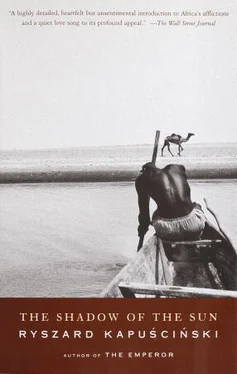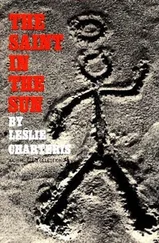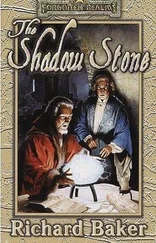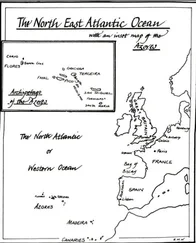Whoever has a more mobile occupation, and less respect for tradition, tries to cover his tracks. In Dodoma, I once ran into a street vendor hawking oranges who used to bring these fruits to my house in Dar es Salaam. I was happy to see him, and asked him what he was doing here, five hundred kilometers from the capital. He had had to flee from his cousins, he explained. He had shared his meager profits with them for a long time, but finally had had enough, and ran. “I will have a few cents for a while,” he said happily. “Until they find me again!”
Social advancements of this type are still relatively infrequent in Dar es Salaam in the years immediately following independence. In the white neighborhoods, whites still dominate. For Dar es Salaam, like other cities in this part of the continent, consists of three distinct quarters, separated from one another either by water or by a stretch of bare ground.
The best neighborhood, close to the sea, belongs of course to the whites. It is called Oyster Bay: magnificent villas, gardens exploding with flowers, thick lawns, smooth, gravel-strewn avenues. Yes, you can live truly luxuriously here, especially since you don’t have to do anything yourself: everything is taken care of by quiet, vigilant, discreetly moving servants. Here, a man ambles along as he probably would do in paradise: slowly, loosely, content that he is here, enchanted by the beauty of the world.
Beyond the bridge, on the other side of the lagoon, significantly farther from the sea, lies a paved-over, crowded, busy, mercantile neighborhood. Its inhabitants are Indians, Pakistanis, natives of Goa, arrivals from Bangladesh and Sri Lanka, all of them collectively called Asians here. Although there are several men of great wealth among them, the majority are middle class, living without any excess. They are traders. They buy, sell, act as middlemen, speculate. They are always counting something, counting endlessly, shaking their heads, quarreling. Dozens, hundreds of shops, wide open, their goods spilling out onto the sidewalks, onto the streets. Fabrics, furniture, lamps, pots and pans, mirrors, knickknacks, toys, rice, syrups, spices — everything. In front of a shop sits a Hindu, one foot resting on the seat of his chair, his fingers digging at his toes.
Every Saturday afternoon, the inhabitants of this airless, swarming neighborhood go to the seashore. They dress in their finest clothes — the women in golden saris, the men in neat shirts. They travel by car. The whole family piles in, perched on one another’s laps, shoulders, heads — ten, fifteen people. They stop the car on the steep slope above the ocean. At this time of day, the incoming tide pounds the beach with powerful, deafening waves. They open the windows. They breathe in the salty smell. They air themselves. On the other side of the immense body of water before them lies their country, which some don’t even know anymore: India. They spend fifteen minutes here, maybe a half hour. Then the convoy drives off and the shore is empty again.
The farther from the sea, the greater the heat, the aridity, and the dust. It is there, on the dry sand, on the bare, barren earth, that stand the clay huts of the African quarter. Its individual neighborhoods bear the names of the old slave villages of the sultan of Zanzibar: Kariakoo, Hala, Magomeni, Kinondoni. The names may vary, but the quality of their clay houses is uniformly low, and their standard of living wretched, with no prospect of improvement.
For the people of those neighborhoods, independence means being free to walk at will the main streets of this city of more than a hundred thousand, and even to venture into the white areas. It was never really forbidden, because the African could always turn up there, but he had to have a clear, concrete goal: he either had to be going to work, or going home from work. The policeman’s eye easily distinguished between the gait of someone hurrying to some task and purposeless, suspicious loafing. Everyone, depending on the color of his skin, had his assigned role and prescribed place.
Those who wrote about apartheid emphasized that this was a system invented and enforced in South Africa, a state governed by white racists. But apartheid is a much more universal, common phenomenon. Its critics maintained that it is a system instituted by rabid Boers so that they could rule indivisibly and keep the blacks in the ghettos, which were called bantustans. The ideologists of apartheid defended themselves: We believe that all people are entitled to better their circumstances and to develop, but, depending on the color of their skin and their ethnicity, to develop separately. This was a piece of fraudulence, for whoever knew the reality understood that behind this support for equal development lay a deeply inequitable and unjust state of affairs: the whites possessed the best plots of land and the cities’ richest neighborhoods, and they controlled industry, while the blacks were consigned to crowded, wretched scraps of semi-arid land.
The concept of apartheid was so perverse that with time its principal victims began to discover certain advantages in it, a chance for a kind of self-reliance, the comfort of being in one’s own backyard. The African could say: “It is not only I, the black man, who cannot enter your area, but you, too, the white man, if you want to stay in one piece and not place yourself in danger, you had better not come into my neighborhood!”
It was in such a city that I arrived as the correspondent of the Polish Press Agency, and in which I was to spend several years. Going about its streets, I quickly realized I was in the net of apartheid. First of all, the issue of skin color suddenly loomed large. In Poland, in Europe, I never thought about it. Here, in Africa, it was becoming the most important determinant of my identity, and for simple people, the sole one. The white man. White, therefore a colonialist, a pillager, an occupier. I subjugated Africa, conquered Tanganyika, put to the sword the entire tribe of the man just now standing before me, the tribe of his ancestors. I made him an orphan. Moreover, a humiliated and powerless orphan. Eternally hungry and sick. Yes, when he looks at me, this is exactly what he must be thinking: the white man, the one who took everything from me, who beat my grandfather on his back, who raped my mother. Here he is before me, let me take a good look at him!
I could not adequately resolve the question of guilt. In their eyes, I was guilty. Slavery, colonialism, five hundred years of injustice — after all, it’s the white men’s doing. The white men’s. Therefore mine. Mine? I was not able to conjure within myself that cleansing, liberating emotion — guilt; to show contrition; to apologize. On the contrary! From the start, I tried to counterattack: “You were colonized? We, Poles, were also! For one hundred and thirty years we were the colony of three foreign powers. White ones, too.” They laughed, tapped their foreheads, walked away. I angered them, because they thought I wanted to deceive them. I knew that despite my inner certainty about my own innocence, to them I was guilty. These barefoot, hungry, and illiterate boys had a moral advantage over me, the sole advantange an accursed history bestows upon its victims. With rare exceptions, they, the black men, had never conquered anybody, hadn’t occupied, hadn’t enslaved. They could regard me from a position of superiority. They were of a black race, but a pure one. I stood among them weak, with nothing more to say.
I didn’t feel comfortable anywhere. The color of my skin, albeit privileged, also confined me to the cage of apartheid. A gilded cage — Oyster Bay — but a cage nonetheless. Oyster Bay is a beautiful neighborhood. Beautiful, blooming with flowers — and boring. Granted, one could stroll here amid tall palm trees, admire the billowing bougainvillea and the elegant, delicate tuberose, the cliffs covered with thick seaweed. But what else? Besides this, what? The residents of the neighborhood were colonial bureaucrats, who thought only of getting to the end of their contract, buying a crocodile skin or a rhinoceros horn as a souvenir, and leaving. Their wives discussed either the children’s health or a past or upcoming party. And I had a daily story to file! About what? Where would I get the material? There was one small local newspaper, the Tanganyika Standard . I visited its editorial offices, but the staff consisted of these very same Englishmen from Oyster Bay. And they too were already packing.
Читать дальше












